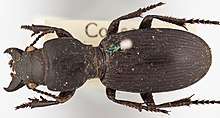Mecodema curvidens
Mecodema curvidens Broun is a medium-bodied ground beetle that is geographically widespread throughout the central areas of the North Island, New Zealand, which includes the entomological regions[1] of Auckland (AK), Waikato (WO), Coromandel (CL), Bay of Plenty (BP), Taupo (TO), Rangitikei (RI), Whanganui (WI), Hawkes Bay (HB) and Wellington (WN). Recently, the species M. occiputale Broun was synonymised under M. curvidens (Seldon & Buckley 2019). Mecodema curvidens is relatively common through its range except in the southern area of the Hunua Ranges (Auckland) and Wellington regions.[2]
| Mecodema curvidens | |
|---|---|
 | |
| Scientific classification | |
| Kingdom: | Animalia |
| Phylum: | Arthropoda |
| Class: | Insecta |
| Order: | Coleoptera |
| Family: | Carabidae |
| Genus: | Mecodema |
| Species: | M. curvidens |
| Binomial name | |
| Mecodema curvidens Broun 1915 | |
Diagnosis
Distinguished from other North Island Mecodema species by having:
- pronotal carina with 4–6 setae each side (curvidens species group);
- a vertexal groove that is narrow and defined entire length;
- distinctive form of the basal lobe and setal distribution along ventral edge of the left paramere.[3]
Description
Length 18–26 mm, pronotal width 5.4–7.53 mm, elytral width 6.13–8.56 mm. Colour of entire body glossy to matte black, except coxae to tarsi reddish-brown to black.[3]
References
- Crosby, T. K.; Dugdale, J. S.; Watt, J. C. (March 1976). "Recording specimen localities in New Zealand: An arbitrary system of areas and codes defined". New Zealand Journal of Zoology. 3 (1): 69. doi:10.1080/03014223.1976.9517903. ISSN 0301-4223.
- SELDON, DAVID S.; LESCHEN, RICHARD A. B. (2011-04-22). "Revision of the Mecodema curvidens species group (Coleoptera: Carabidae: Broscini)". Zootaxa. 2829 (1): 1. doi:10.11646/zootaxa.2829.1.1. ISSN 1175-5334.
- Seldon, D.S.; Buckley, T.R. (2019). "The genus Mecodema Blanchard 1853 (Coleoptera: Carabidae: Broscini) from the North Island, New Zealand". Zootaxa. 4598 (1): zootaxa.4598.1.1. doi:10.11646/zootaxa.4598.1.1. ISSN 1175-5334. PMID 31716064.